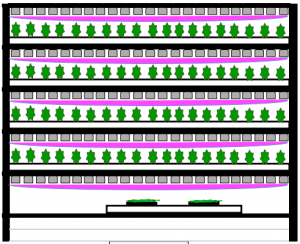By J. Dirk Nies -November 3, 20220329

“Plenty’s decision to establish its first major east coast vertical farming campus in Virginia shines a spotlight on the advantages that make the Commonwealth the best location in the nation for companies growing our food safely and sustainably indoors. This transformational project further bolsters Virginia’s agriculture and technology industries and positions the Commonwealth as a leader in this next generation of agriculture.”
– Governor Glenn Youngkin, September 14, 2022 Press Release.
World-class Controlled Environment Agriculture (CAE) in the form of indoor vertical farms has arrived in Virginia in a big way.
In vertical CAE food factories, crops are grown either in stacked layers or upon walls or vertical columns in large warehouse-like structures. Shielded from the vicissitudes of weather and climate change, these indoor vertical farms provide fruits and vegetables optimal growing conditions year-round while at the same time warding off disease and curbing pest damage.
To reduce farm-to-table transportation miles, indoor vertical farm operations can be readily set up near urban centers. Anywhere there is reliable electrical power, vertical farms can provide city dwellers with fresh, local produce.
Grown in the absence of soil, roots receive water, fertilizer, and trace nutrients via aqueous solutions, mists, or gels.
Eschewing sunlight, vertical farms rely solely upon artificial light sources to promote photosynthesis in plants. LEDs—tailored to emit radiation at specific wavelengths—deliver lighting optimized to elicit the full potential and desired characteristics of every plant in the factory.
Electronic sensors continuously monitor temperature, humidity, lighting, CO2 levels, plant growth, and many other parameters. The plethora of information gathered (literally billions of data points) is stored on computers and analyzed by proprietary Artificial Intelligence (AI) systems to optimize flavor, texture, and size. Armed with this intelligence, cadres of robots facilitate planting, growing, harvesting, and packaging.
Indoor farm workers are not garbed in typical farming clothes. In a Through the Noise podcast, Dr. Nate Storey, co-founder and chief science officer (CSO) of Plenty, said: “When you walk into our farms, you gown up, you put on special shoes or booties, you put on gloves, you have a face mask, you have a hair net, you have a beard net, you’re basically like covered from head to toe, so you’re going in relatively sterile.”
Strawberries for Sale
Plenty Unlimited Inc.’s indoor farm complex, located at the Meadowville Technology Park in Chesterfield County outside Richmond, is slated to be the largest in the world. Vertically-farmed Driscoll strawberries will be the first product offered for sale.
“This farm will combine Driscoll’s patented berry varieties with Plenty’s patented indoor vertical farming technology,” said J. Miles Reiter, Driscoll’s chairman and CEO.
Beginning in the winter of 2023-2024, shoppers will be able to buy vertically farmed fresh strawberries year-round at grocery stores throughout the Northeast. And by 2030, when Plenty’s $300 million, 300-employee, 120-acre factory farm campus is operating at full capacity, annual production of fresh leafy greens, tomatoes, and the above-mentioned strawberries will exceed 20 million pounds.
No Sun, No Problem!
Illuminating fruits and vegetables with LEDs at the scale of a factory requires a lot of electricity. “We are excited that Plenty has chosen Chesterfield County for their first East Coast facility,” said Felicia Howard, vice president of economic development strategy for Dominion Energy. “Dominion Energy looks forward to providing them the necessary power to successfully reach new markets.”
Gene Editing Plants for Vertical Farms
“The kinds of plants that we are going to ultimately have in [plant factories] are not going to be the same kind of plants that we have in soil.” These are the words of Dr. Huw Jones, Institute of Biological, Environmental and Rural Sciences (IBERS) Professor of Translational Genomics for Plant Breeding, spoken at a Food and Nutrition Forum held in London.
Novel plant varieties will be genetically tailored to optimize quality and yield for plant factories. Agrobiotechnology companies are racing to fill this need. Corveta Agriscience™, spawned in 2019 from the resources and expertise of Dow Chemical and DuPont, is well positioned to be a global player in seed development. And so, too, is the German agrobiotech company Bayer, which acquired GMO crop producer Monsanto in 2018. Teaming with Singapore’s Temasek, a global investment company, Bayer has launched Unfold Bio Inc., a company “specifically focused on the vertical farming industry and its unique growing requirements.” Unlike Monsanto, Unfold will not develop GMO seed varieties. They will use other breeding techniques, including gene editing.
As U.S. regulations now stand, if these breeding techniques employ gene editing technology such as CRISPR, the resultant plants need not be labeled as GMO.
The Future is Accelerating Towards Us
Vertical farming saw revenues of $2.1 billion in 2018. This market is poised to grow to $12 billion by 2026, according to a report by Fortune Business Insights.
Plenty is not the only player in Virginia. This summer, AeroFarms debuted the world’s largest aeroponic smart farm in Danville. Their state-of-the-art operation features “hands-free farming with end-to-end automation from seeding to growing to harvesting to packaging.”
I wish for local farmers to be alert to these dramatic innovations in agricultural practices coming upon us at warp speed. I wish for ordinary citizens to be engaged in the conversation about the many benefits and the potential downsides attendant to this revolution in agriculture.
I also believe that we now need new labels to describe the food we are buying and what we are eating. Vertical farm fruits and vegetables are pesticide-free. That’s great! But are they organic? Plants that have never felt the warmth of the sun nor the cool refreshment of rain, never drawn nourishment from soil teeming with microbes nor visited by pollinators buzzing by on a spring breeze. Should we call them organic?
The electronics giant Panasonic is expanding its vertical farm operations in Southeast Asia. What should we call their leafy greens that have lived their entire existence in environments as sterile as found in the manufacture of electronics? How should we label tomatoes grown in clean environments as hermetically sealed off from Nature as found in the manufacture of pharmaceuticals?
Pseudofarmicals is the word I have coined for this purpose. What word label would you suggest?
Nothing is more vital to our health and wellbeing than the safety, reliability, nutritional quality, flavor, and affordability of the food we eat. And no human activity has a greater impact on Nature than does agriculture. How we achieve the twin goals of good food and a vibrant environment is perhaps the greatest challenge we face in the 21st century. The consumer choices we make in the restaurant and the grocery store will in large measure determine how well we meet these goals.

